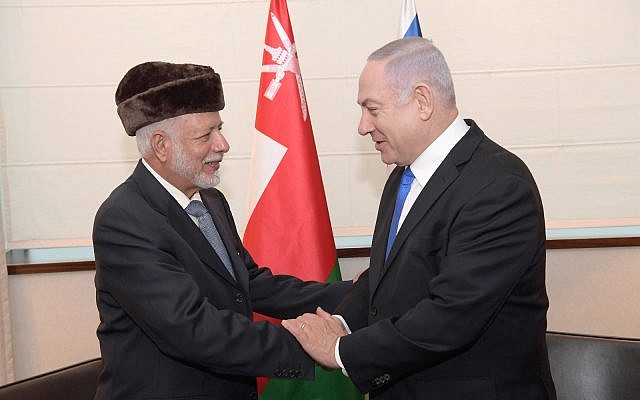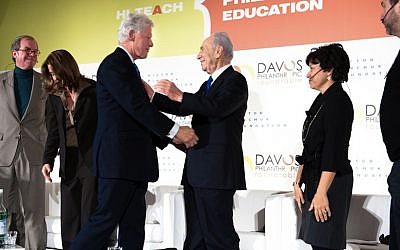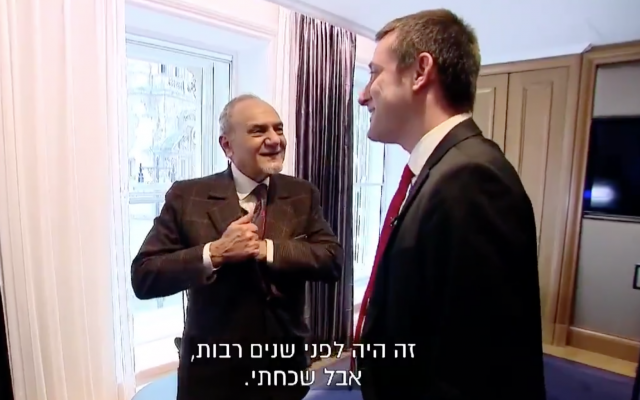Saudi Prince Turki to Israeli TV: Netanyahu deceiving Israel about peace chances
Veteran diplomat, in unprecedented interview, says Riyadh wants to ‘get our point across directly’ to Israelis: Solve the Palestinian issue and then ‘we can go far’
In an unprecedented interview with an Israeli TV station broadcast Wednesday, the former Saudi intelligence chief and ex-ambassador to the US and UK accused Prime Minister Benjamin Netanyahu of deceiving the Israeli public by claiming that Israeli ties with the wider Arab world can be warmed without the Palestinian issue being solved.
“Israeli public opinion should not be deceived into believing that the Palestinian issue is a dead issue,” Prince Turki bin Faisal Al Saud told Israel’s Channel 13 news in a lengthy interview in London. “From the Israeli point of view, Mr. Netanyahu would like us to have a relationship, and then we can fix the Palestinian issue. From the Saudi point of view, it’s the other way around.”
Asked by interviewer Barak Ravid whether that meant Netanyahu was “deceiving the Israeli public” by claiming to be able to “promote relations with the Arab world regardless of the Palestinians,” Prince Turki replied: “Absolutely. Absolutely.”
Asked why Netanyahu would do that, the prince said: “For his own purposes.” Laughing, he continued: “He’s a man who runs for election on platforms of ‘look what I have done for you. I have brought you this. I have brought you that.’ Like all politicians.”
The prince said the Saudi public has “a very negative view of Mr. Netanyahu because of what is happening on the ground,” and because of what he termed Netanyahu’s “hubristic attitude… praising himself.”
Ironically, the interview was broadcast only hours after Netanyahu, who is in Poland, met with the foreign minister of Oman, and the two men discussed a new era for the Middle East. Netanyahu has said often that shared concern about Iran is one of the factors helping to gradually warm Israeli ties with Gulf states and others in the region.
“We don’t need Mr. Netanyahu to tell us the dangers that Iran poses,” the Saudi prince stressed. “We see it on the ground. We see their activities in Lebanon. We see their activities in Syria, in Iraq, in Yemen, in Bahrain, even in Saudi Arabia. So why should we wait for Mr. Netanyahu to highlight these things? We don’t need that.”

Prime Minister Benjamin Netanyahu (right) greets Omani Foreign Minister Yusuf bin Alawi bin Abdullah at the sidelines of a regional conference on the Middle East in Warsaw, February 13, 2018 (Amos Ben Gershom/GPO)
Asked how he would advise the Trump administration as it prepares to present its peace plan, Prince Turki said simply: “The Arab Peace Initiative — take it on. Make it yours.”
He recalled that the late Saudi King Abdullah initiated the plan in 2002. “Basically it’s a quid pro quo: Israel withdraws from occupied Arab territories, in return for Arab recognition of Israel, end of hostilities and normal relations.”
However, he said, “from day one there has not been an Israeli response.” (In 2015, Netanyahu said he backed the “general idea” behind the initiative. Former prime minister Olmert indicated he saw it as a basis for discussion.)
“With Israeli money and Saudi brains, we can go far,” the prince said, but added: “Yes, if there is peace. Unfortunately,” he charged, “Israel chooses to ignore all the efforts of Saudi Arabia to make peace, and expects Saudi Arabia to put its hand in its [Israel’s] hand and go forward on technology, on water desalination, on issues like that. It’s not going to happen,” he exclaimed.
“Israel has not been very cooperative as far as achieving peace in our part of the world,” he also said.
Prince Turki insisted there was no difference between Saudi King Salman and Crown Prince Mohammed bin Salman when it came to Israel, rejecting the notion that the king had curbed the crown prince’s inclination to warmer ties.
The crown prince “is a stalwart representative of Saudi policy,” he said, and the idea that there was a warmer stance from him was likely “wishful thinking on the part of Israeli officials.” The crown prince “supports the Palestinian cause to the fullest” and had no differences with the king “on any issue. He does what the king tells him.”
The Saudi prince clarified that he was giving the interview in a personal capacity, and “I do not represent the government of Saudi Arabia in any capacity whatsoever.” Nonetheless, asked if it was known in Riyadh that he would be speaking to an Israeli TV station, he said it was normal “courtesy and good manners” to tell people what he was going to be doing.
Ravid said Prince Turki had met with the Saudi king in the days before the interview, and that the prince was plainly conveying a message that Riyadh wants heard in Israel.

President Shimon Peres shakes hands with former US President Bill Clinton, during a meeting at the World Economic Forum in Davos, Switzerland, in 2010 (Sergei Illin/Flash 90)
During his years in government, the prince said he had never held official meetings with Israelis, except with president Shimon Peres, over dinner in Davos. Peres suggested they hold more substantive, private talks, but Prince Turki said he demurred: “I told him, Mr. President, nothing in Israel remains a secret.”
He said he was speaking to Israeli television now because “we have to get our point across directly to the Israeli people.”
The prince, who is 73, said he had never been to Jerusalem and looked forward “to the day when there is peace between Israel and the Arab world, and I can visit what I consider to be not only a holy place, but a place of my history as an Arab and as a Muslim. Abraham, our father, is not only the father of the Jews. He is the father of the Arabs. Jerusalem is something I want to see before I die. Unfortunately, I’m not too optimistic that I’m going to see that.”
Asked whether he expected to witness a meeting between an Israeli prime minister and a Saudi king or crown prince in his lifetime, Prince Turki said: “In my lifetime — and there’s very little of it left to come — I don’t think I’m going to see that. Not before the Palestinian issue is resolved. I am looking for an Israeli peace initiative. I haven’t seen one. What is it that Israel thinks will make peace?”





Geen opmerkingen:
Een reactie posten